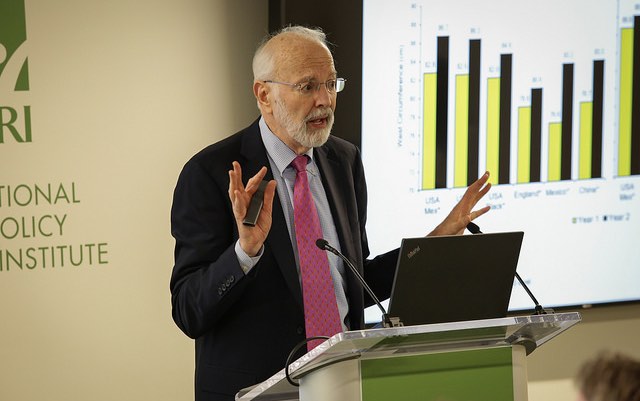Efforts to improve global nutrition face serious headwinds from the growing marketing and consumption of processed foods and sugary beverages in developing countries, University of North Carolina Professor of Nutrition Barry M. Popkin told an audience at IFPRI Oct. 29. Delivering the 28th annual Martin J. Forman Memorial Lecture, Popkin described the public health threats of this alarming “new face” of malnutrition—and explored promising policy solutions to combat the trend and improve diets.
“Evolution and modern technology are clashing,” Popkin said, focusing on three major shifts in the global food system—toward added sugars, snacking, and fatty foods and edible oils. Today’s diets are profoundly different than they were a century or more ago, he said. Snacking did not exist then, and seasonality meant that there were periods of feast and famine to balance people’s food consumption. As diets changed, physical activity at home and work declined (a trend now accelerating in Africa south of the Sahara), a shift associated with a doubling of overweight.
Today, snack foods, heavily promoted by food companies around the world, make up one of the biggest growth sectors in the modern food industry, Popkin said, and many people now consume more than three meals daily heavy in junk food and cheap sugary beverages.
These negative trends are increasingly affecting the poor throughout Asia and Africa, who often face a triple burden of obesity, undernutrition, and micronutrient deficiency, Popkin said. Companies including Pepsi and Coca-Cola are moving heavily into these new markets as countries’ incomes increase, he noted, where a sub-population of 20-40 percent consumes most of the sugary beverages. Often these people lack adequate access to medical care to treat health problems associated with their overconsumption, such as diabetes.
As if this was not depressing enough, Popkin noted that the global standard for measuring obesity, the Body Mass Index (BMI), is fundamentally flawed due to widely varying body fat percentages and rankings among different races and ethnicities. A South Asian, African, or Hispanic male’s BMI, even when identical to that of a non-Hispanic white male, can signal very different health realities, Popkin said. For example, a BMI of 22 in an Indian male indicates he is overweight and at risk for diabetes but is considered “normal weight” in his non-Hispanic white male counterpart.
There is hope, however, that effective public policies can combat unhealthy trends, Popkin said. In Mexico, for example, a 10 percent sales tax on certain sugary beverages and an 8 percent sales tax on junk foods both helped to reduce sales of those items and increase water and non-junk food sales. That effort requires more study, he said—for instance, it is not clear what buyers substituted for the taxed items, and policy makers should understand the impacts of a regressive tax largely affecting low income Mexicans. But, he said, this group has high rates of undiagnosed health issues resulting from over-consuming these items—so, from a public health perspective, the sales taxes are a positive step.
Chile, meanwhile, has instituted bans on marketing certain junk foods to children and requires prominently-displayed warning labels—which led to children advising parents not to buy junk foods for them, Popkin said.
More than 39 countries have implemented sales taxes on sugary beverages, following Mexico’s example, Popkin said—a reason for hope going forward. In addition, governments have options including fiscal measures, food service regulations, marketing and advertising controls, social marketing and nutrition education, in addition to the industry’s voluntary efforts.
It’s an uphill battle, Popkin admitted, but improving the quality of food and beverage consumption is worth fighting for as it affects everyone and is the biggest single cause of 13 major cancers and cardiovascular diseases.
The Forman lecture commemorates the work of Martin J. Forman, longtime head of the U.S. Agency for International Development Office of Nutrition. “A world free of hunger and malnutrition” and “promoting healthy diets and nutrition for all” are key components of IFPRI’s vision and strategic research areas. Long before these topics became popular obsessions, Forman was making tremendous contributions in the field of international nutrition—drawing attention to nutrition planning, playing a critical role in the development of the United Nations’ subcommittee on nutrition, and launching several micronutrient initiatives.
Katarlah Taylor is an IFPRI Senior Events Specialist.







